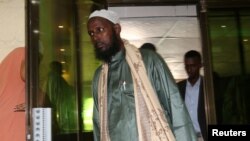The former No. 2 leader of Somalia-based militant group al-Shabab will not be allowed to run for the presidency of the country's South West regional state, the Somali government said Friday.
A statement by the internal security ministry said Mukhtar Robow was not eligible to run for political leadership at this time, citing U.N. sanctions.
"In respect of the international laws on counterterrorism and the fact that Robow is still subject to sanctions imposed by the United Nations Security Council, he cannot run for the presidency of South West regional state," read the statement.
It added, "Robow did not fulfill the preconditions that would have eventually allowed him to run for such an office." The statement did not give details on the conditions.
Robow, also known as Abu Mansour, announced his candidacy Thursday to hundreds of his supporters at a rally in Baidoa.
"After receiving requests from the people of this region and their intellectuals, I have decided to run for the president of this state in the coming election," Robow said at the rally. "I have accepted the requests and, if God wills, we will win and peace will prevail."
Contacted Friday by VOA's Somali service, Robow declined to comment on the government's statement.
U.S. reaction
A U.S. State Department official said ex-militant leaders like Robow should disavow their former groups and radical ideologies before re-entering Somali civil society.
"The United States strongly encourages members of terrorist groups such as al-Shabab and ISIS to reject violence, defect and follow through with Somalia's National Defections Strategy, including renouncing terrorist organizations and supporting efforts to degrade them," the official told VOA on Friday. "High-level defectors must demonstrate that they are fully rehabilitated and committed to reconciliation, human rights and responsible governance."
If he is eventually allowed to run, Robow, who once had a $5 million U.S. bounty on his head, will face 10 other candidates in the Nov. 27 election. Other contenders include the current head of the South West state and former Somali parliament speaker, Sharif Hassan Sheikh Adan.
Al-Qaida roots
Robow is an elusive, charismatic militant leader who received training from al-Qaida in Afghanistan and was once a senior commander in al-Shabab. In 2012, the Obama administration offered up to $33 million for information on the location of top members of the group, including him.
But that same year, Robow fell out with the group's emir — Ahmed Godane, killed by a U.S. drone strike in 2014. He retreated to his home region, protected by a personal guard.
With al-Shabab fighters still trying to kill him, he surrendered to the government last year after secret negotiations.
Robow appeared to be more moderate than many of his former comrades. In 2009, he freed five Somali parliament lawmakers after his militants took over Baidoa, which was then the headquarters of Somalia's transitional federal government.
On other occasions, Robow condemned al-Shabab's attacks on civilian targets. However, an official with the Somali presidential office said Friday that Robow still lacked the trust of both Somali government and its international friends, including the United States.
The official, speaking on condition of anonymity because he was not authorized to publicly comment on the issue, said there was no sign Robow felt any guilt or regret for his actions.
"The guy has not shown remorse for the past deadly terror actions committed by his group, while he was in the highest ranks, and did not publicly apologize to the Somali people. So I think the government and its international partners cannot trust him to hold such a leadership position at this moment," the official said.
Professor Mohamed Hagi Mukhtar of Savannah State University in Georgia said he thought there might be a political motive behind the opposition to Robow.
"I do not know if he would be able to govern, but the fact that local people who are fed up with insecurity and the al-Shabab presence in the region prefer him made other politicians feel politically threatened, and that could be another factor why the government does not want him to get on a position of power," Mukhtar said.




